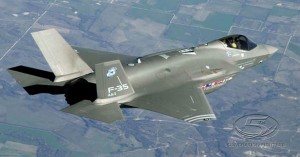Special to WorldTribune.com
Monday, May 30, 2011
TEL AVIV — Less than a year after it signed an agreement for procurement of the F-35, Israel fears that it would be left without an advanced U.S. fighter-jet.
Officials said the Israel Air Force and Defense Ministry have been scrambling to determine the future of the Joint Strike Fighter amid threats from Congress. They said a high-level Israeli defense delegation would travel to Washington to examine the JSF project and a delivery schedule.

“We knew there were problems with the airplane, but things are much worse than we had been told,” an official said.
In August 2010, the Israeli Defense Ministry signed a Letter of Order and Acceptance for the procurement of 20 F-35s from Lockheed Martin. At the time, officials said the deal, reported at $2.7 billion, stipulated initial delivery by 2016, Middle East Newsline reported. But technical delays could block the development of an operational JSF. Officials cited a series of problems, including avionics, engine and integration.
“The F-35 is vital to our existence and will provide a dramatic leap in capabilities,” Israel Air Force commander Maj. Gen. Ido Nehushtan said.
Since then, however, Israel has remained the only foreign country to have ordered JSF. JSF partners such as Britain, Italy, the Netherlands and Turkey have been dismayed by the performance of the F-35 as well as cost overruns and the U.S. refusal to release source codes.
Israeli officials now acknowledge that the delivery schedule could be delayed by several years and spark a crisis within the air force. They said the air force has urged the Defense Ministry to begin negotiations to lease surplus F-15 fighter-jets from the United States.
“I imagine a dialogue will start with the Americans over a new schedule and changes,” Defense Ministry director-general Udi Shani said.
Shani told the Israeli daily Haaretz that an Israeli delegation would hold talks with the U.S. Defense Department over JSF. He said the delegation would also discuss such issues as technology transfer and the installation of Israeli systems on the F-35, something long opposed by Washington.
At this point, the Israel Air Force continues to project optimism. On May 25, Nehushtan told the Fischer Institute for Air and Space Strategic Studies that he still believes in the JSF program despite expected delays and wants air training to begin in 2016.
“The forecasted delays in the delivery of the F-35 to [Israel] is less dramatic than what’s being said,” Nehushtan said.
For its part, however, Congress has placed the administration of President Barack Obama on notice that the $1 trillion JSF program could be canceled. In late May, the Senate Armed Services Committee asked the Pentagon to draft alternatives to the F-35, the cost of which has risen by more than 50 percent.
“We cannot sacrifice other important acquisitions in the Department of Defense investment portfolio to pay for this capability,” Senate Armed Services Committee chairman Sen. Carl Levin said.

You must be logged in to post a comment Login